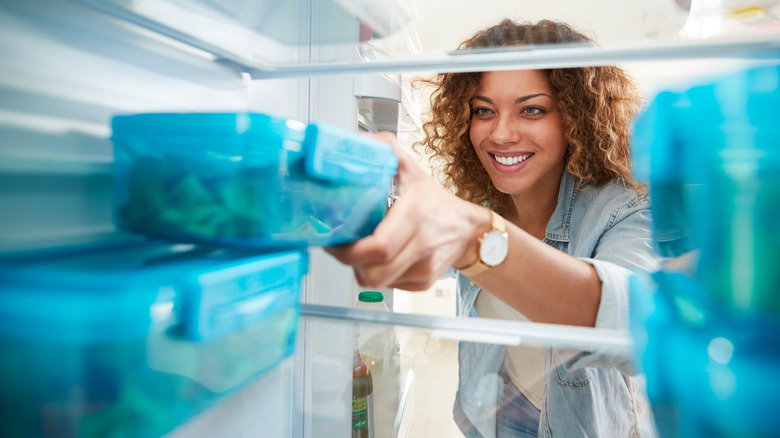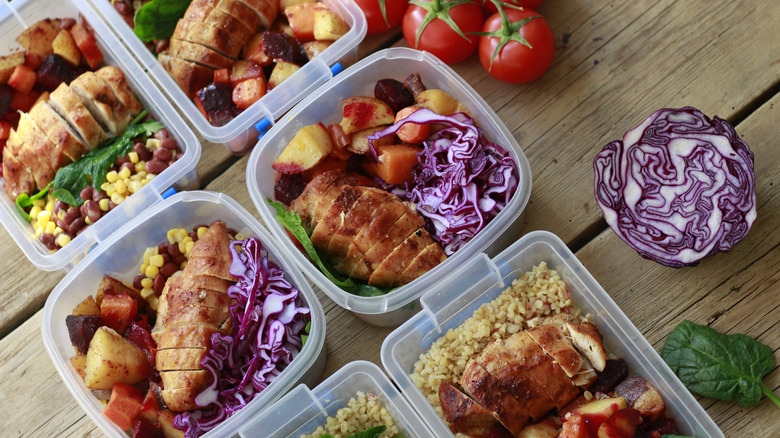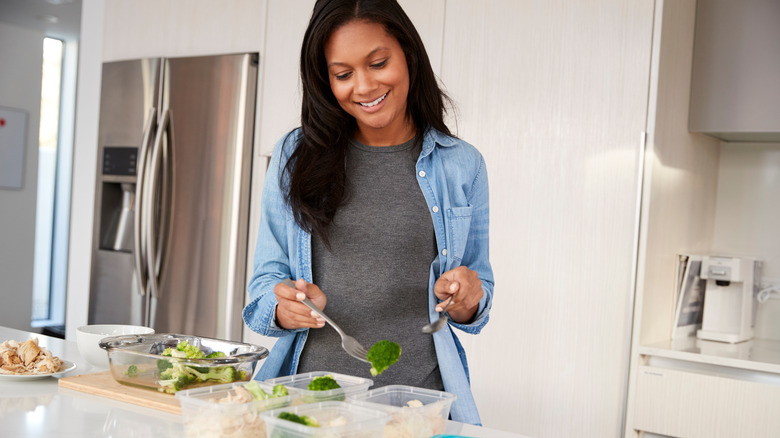How Long Do Prepped Meals Last In The Fridge?
Let's face it, we're all super busy these days. Between a career, a social life, practicing self-care, and catching up on the latest binge-worthy shows, it can be hard to maintain a balanced lifestyle. According to Healthline, meal prepping is "the concept of preparing whole meals or dishes ahead of schedule," and has grown in popularity among people with a busy lifestyle.
Whether you're coming home from a long day at the office or logging off from a full day of zoom calls in your at-home office, meal prepping is a great way to ensure you have plenty to eat when popping something into the microwave is all you have the energy for. For those with nutrition goals they hope to achieve, meal prepping can help manage meal portions and help you avoid ordering takeout every time you don't feel like cooking (via Healthline).
But even expert meal preppers can make mistakes and may have to throw out the occasional meal or two when they see it's spoiled in their fridge. For those who dislike food waste, it may seem like meal prepping is more trouble than it's worth and you might not even get to enjoy the meal you prepared on Sunday and planned to eat on Friday. Fortunately, learning about the expiration dates of your different meals can help you plan when to enjoy them, how to store them, and how to keep them tasting fresh for longer.
How to plan for a week's worth of refrigerated meals
If you prepare your meals on Sunday, you should make it through your work week with delicious refrigerated dishes ready for you to heat up or unwrap and enjoy. But the types of dishes vary, and you might want to consider putting others in the freezer if you hope for a full week of prepped meals.
According to Work Week Lunch, dishes like pasta, green salads, rice bowls, and sheet pan meals are all good for up to four days in the refrigerator. If you plan on enjoying any of them after the four-day mark, freeze them instead and thaw them out the morning you plan to eat them. Overnight oats can be refrigerated between 3-4 days before going bad, and probably won't survive your freezer. Soups, chillis, and stews last up to five days in the fridge, and are the easiest meals to freeze and reheat. Baked goods like muffins and brownies can last up to seven days in the fridge, and can last in the freezer for up to three months, according to The New York Times.
After you prepare your meals, you might be tempted to cool them to room temperature before refrigerating. But WebMD debunks the myth that warm food shouldn't be put into the fridge — it's perfectly safe and encouraged that you refrigerate your meals as soon as they are prepared if you don't plan to eat them right away.
Proper food storage will keep your prepped meals fresh
When meal prepping, it's important to know the proper way of storing your meals and the best methods of reheating them. Meal Plan Magic reminds us that incorrect food storage can put you at risk of food pathogens. Unlike spoiled food, contaminated food does not usually smell bad or look like anything is wrong, and "occurs most often when food is left out at temperatures above 40F for over two hours" or is stored improperly. When you are prepping your meals, make sure foods like meat and poultry are cooked before they are refrigerated. According to Work Week Lunch, airtight containers are important for storing cooked ingredients, and "need to be refrigerated within two hours of cooking." Most of your meals can be enjoyed by popping them into the microwave, but some dishes like pasta or chili might best be prepared on the stove.
While each food is different and each meal might spoil slightly before or after others, Work Week Lunch says, "When in doubt about how long meals last, think four days." And maybe meal prepping isn't your style, but you like to bring home your leftovers after a night out. Well, the four-day rule applies to your doggy bags and leftover DoorDash, too. Mayo Clinic says after four days, refrigerated leftovers are at risk of giving you food poisoning. Whenever you are prepping, storing, and reheating meals, make sure you are practicing safe food preparation and storage.


